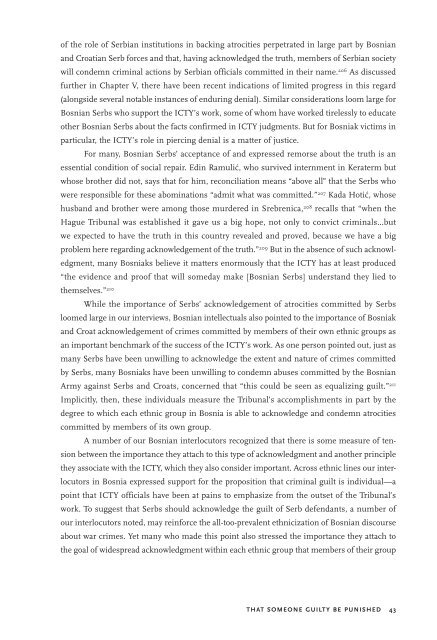That Someone Guilty Be Punished - Open Society Foundations
That Someone Guilty Be Punished - Open Society Foundations
That Someone Guilty Be Punished - Open Society Foundations
Create successful ePaper yourself
Turn your PDF publications into a flip-book with our unique Google optimized e-Paper software.
of the role of Serbian institutions in backing atrocities perpetrated in large part by Bosnian<br />
and Croatian Serb forces and that, having acknowledged the truth, members of Serbian society<br />
will condemn criminal actions by Serbian officials committed in their name. 206 As discussed<br />
further in Chapter V, there have been recent indications of limited progress in this regard<br />
(alongside several notable instances of enduring denial). Similar considerations loom large for<br />
Bosnian Serbs who support the ICTY’s work, some of whom have worked tirelessly to educate<br />
other Bosnian Serbs about the facts confirmed in ICTY judgments. But for Bosniak victims in<br />
particular, the ICTY’s role in piercing denial is a matter of justice.<br />
For many, Bosnian Serbs’ acceptance of and expressed remorse about the truth is an<br />
essential condition of social repair. Edin Ramulić, who survived internment in Keraterm but<br />
whose brother did not, says that for him, reconciliation means “above all” that the Serbs who<br />
were responsible for these abominations “admit what was committed.” 207 Kada Hotić, whose<br />
husband and brother were among those murdered in Srebrenica, 208 recalls that “when the<br />
Hague Tribunal was established it gave us a big hope, not only to convict criminals…but<br />
we expected to have the truth in this country revealed and proved, because we have a big<br />
problem here regarding acknowledgement of the truth.” 209 But in the absence of such acknowledgment,<br />
many Bosniaks believe it matters enormously that the ICTY has at least produced<br />
“the evidence and proof that will someday make [Bosnian Serbs] understand they lied to<br />
themselves.” 210<br />
While the importance of Serbs’ acknowledgement of atrocities committed by Serbs<br />
loomed large in our interviews, Bosnian intellectuals also pointed to the importance of Bosniak<br />
and Croat acknowledgement of crimes committed by members of their own ethnic groups as<br />
an important benchmark of the success of the ICTY’s work. As one person pointed out, just as<br />
many Serbs have been unwilling to acknowledge the extent and nature of crimes committed<br />
by Serbs, many Bosniaks have been unwilling to condemn abuses committed by the Bosnian<br />
Army against Serbs and Croats, concerned that “this could be seen as equalizing guilt.” 211<br />
Implicitly, then, these individuals measure the Tribunal’s accomplishments in part by the<br />
degree to which each ethnic group in Bosnia is able to acknowledge and condemn atrocities<br />
committed by members of its own group.<br />
A number of our Bosnian interlocutors recognized that there is some measure of tension<br />
between the importance they attach to this type of acknowledgment and another principle<br />
they associate with the ICTY, which they also consider important. Across ethnic lines our interlocutors<br />
in Bosnia expressed support for the proposition that criminal guilt is individual—a<br />
point that ICTY officials have been at pains to emphasize from the outset of the Tribunal’s<br />
work. To suggest that Serbs should acknowledge the guilt of Serb defendants, a number of<br />
our interlocutors noted, may reinforce the all-too-prevalent ethnicization of Bosnian discourse<br />
about war crimes. Yet many who made this point also stressed the importance they attach to<br />
the goal of widespread acknowledgment within each ethnic group that members of their group<br />
THAT SOMEONE GUILTY BE PUNISHED 43

















